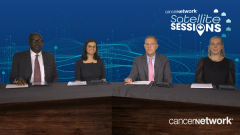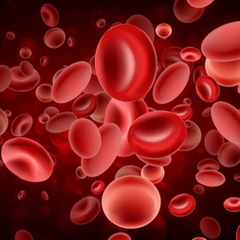
Multiple Myeloma: Treating Patients Who Have Relapsed Multiple Times
A panel of experts discuss treatment and CAR T-cell therapy options for patients with relapsed/refractory disease who have limited treatment choices.
Episodes in this series

Transcript:
Peter Voorhees, MD: We’re going to go ahead and we’re going to move on to the next topic of discussion, which is patients who have relapsed numerous times and are starting to run out of treatment options for their disease. The first question I want to ask you guys is [about] when you’re considering CAR T-cell therapy. We’ve got 2 FDA-approved products now; we’ve got ide-cel [idecabtagene vicleucel], otherwise known as a Abecma. We’ve got cilta-cel [ciltacabtagene autoleucel], otherwise known as Carvykti, and we’ve got our first bispecific antibody, teclistamab, or also called Tecvayli, all of which are directed against BCMA [B-cell maturation antigen]. At what point would you consider referring a patient to someone like me for consideration of CAR T-cell therapy or a bispecific antibody therapy? [Dr Osei-Boateng]?
Kwabena Osei-Boateng, MD: Well, typically when they failed all 3 groups, the IMiDs [immunomodulatory drugs], the proteasome inhibitors, and the monoclonal antibodies, my thought process is to send them to you early because I know the logistics of getting CAR-T cell [therapy], so sooner is always better than waiting because of seeing you and arranging to get it done. I’m an early referrer, as you know.
Peter Voorhees, MD: Right. Absolutely. I think that that’s great. I think that’s the right thing to do. Because to your point that especially with CAR T-cell therapy, there are a lot of logistics involved with regard to scheduling patients for apheresis, for collection of the T cells. There’s the manufacturing process, and there’s a lot of coordination of care that comes into play both before apheresis, so what regimen are we going to use to control the disease in the lead-up to apheresis? When are we going to stop treatment prior to apheresis? We like at least a 2-week washout from chemotherapy before we do apheresis. There are certain drug classes that may impact the manufacturing process as far as the CAR T cells themselves. We try to avoid, for example, alkylating agents when we can. There may be circumstances where it’s unavoidable and we have to use them, but when we have a choice, we like to avoid the alkylating agents prior to apheresis. Then as far as the manufacturing process, for ide-cel, typically it’s about 4 to 6 weeks before from apheresis to the time that the product goes into the patient. For cilta-cel, we’re talking about 5 to 7 weeks. Patients are typically going to get 1 to 2 cycles of bridging therapy. There’s coordination of care that’s involved in that as well. I think there are a lot of reasons to refer these patients sooner rather than later.
One of the challenges that we come into, and this problem will be hopefully alleviated in the near future when we talk about the phase 3 studies. But one of the issues that we run into is the label for all 3 of these agents, for ide-cel, cilta-cel, and teclistamab. That is, the FDA has approved these therapies for patients who’ve had at least 4 prior lines of therapy. If patients tolerate a treatment, that means that they’ve relapsed 4 times before they’re going to be considered for treatment. Now, there are going to be different lines of therapy that are used more frequently because of toxicity issues, and you move from one to the next. But that does create a challenge. Because to your point, and I agree with you 100%, it’s this triple-class refractory group of patients who we want to refer for these potential therapies. But typically, a patient is triple-class refractory after they’ve had 2 prior lines of therapy.
Reed Friend, MD: And it becomes more challenging with everyone using the quads up front.
Peter Voorhees, MD: Yes, I agree. We run into this challenge all the time. This is where early referral makes a lot of sense, because what strategy are you going to use to get yourself to that fourth line of therapy and be able to use teclistamab or be able to use one of these BCMA CAR T-cell therapies? I think that that’s an important consideration.
Transcript is AI-generated and edited for clarity and readability.
Newsletter
Stay up to date on recent advances in the multidisciplinary approach to cancer.








































